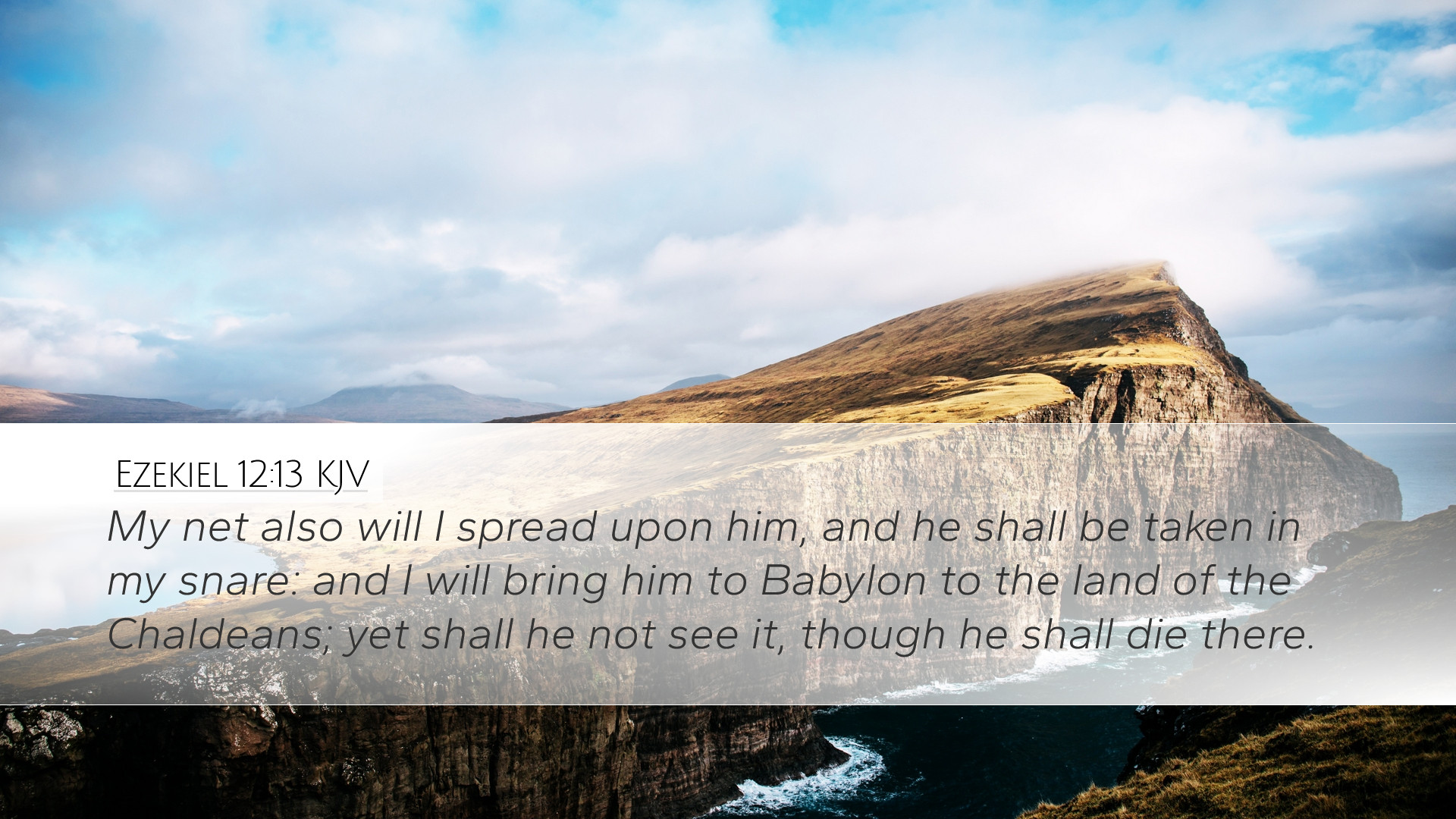Ezekiel 12:13 - Commentary and Insights
Verse: "My net also will I spread upon him, and he shall be taken in my snare: and I will bring him to Babylon to the land of the Chaldeans; yet shall he not see it, though he shall die there."
Contextual Overview
Ezekiel 12:13 occurs within the broader context of Ezekiel's prophecies concerning the impending siege and exile of Jerusalem. The prophet uses vivid imagery to illustrate the fate that awaits Zedekiah, the last king of Judah, who would fall victim to the Babylonian forces while being taken captive. This verse is critical as it underscores themes of divine judgment, the inevitability of prophecy, and the consequences of rebellion against God.
Commentary Insights
Matthew Henry’s Commentary
Henry emphasizes the profound symbolism within this verse, illustrating how God’s judgment operates like a trapping net. Just as a hunter uses a net to ensnare his prey, God's sovereign will orchestrates the capture of Zedekiah:
- The Net of God’s Judgment: Henry draws attention to the metaphor of the net, elaborating that Zedekiah is ensnared not merely by human agents, but by the divine enactment of judgment upon the kingdom of Judah. The net signifies God's control over earthly affairs and the certainty of His prophetic word.
- Blindness to Judgment: The part of the verse stating "yet shall he not see it" points to the king's spiritual blindness and inability to comprehend the extent of his doom. Zedekiah is warned of his impending fate, yet he remains incapable of seeing the reality of his situation, a poignant reminder of the consequences of unrepentant disobedience.
- Symbolism of Babylon: Henry refers to Babylon as not only a geographical place but a symbol of the captivity and spiritual desolation that results from rejecting God's authority. The mention of Babylon evokes a sense of irrevocable loss for the people of Judah, a theme that resonates throughout Ezekiel’s prophecies.
Albert Barnes’ Notes on the Bible
Barnes provides a detailed examination of the implications behind God’s assertion of bringing Zedekiah to Babylon:
- Divine Sovereignty: Barnes highlights that this verse reaffirms the sovereignty of God in orchestrating history. Zedekiah's failure to heed warnings leads to his divine judgment, encapsulated in the words of the prophet.
- Impending Captivity: He draws connections between Zedekiah's fate and that of Israel as a whole. The king's exile to Babylon signifies not only a personal demise but a national calamity, reinforcing the collective guilt of the nation.
- Necessity of Repentance: Barnes emphasizes the missed opportunity for repentance. The king's refusal to listen to the prophets serves as a stark warning to future generations about the dangers of ignoring divine counsel.
Adam Clarke’s Commentary
Clarke’s work brings out nuanced interpretations regarding the literary aspects and theological implications of the verse:
- Literary Craftsmanship: Clarke notes the eloquence of Ezekiel’s metaphorical language. The net represents the omniscient judgment of God, while the reference to death in Babylon emphasizes the inescapable fate awaiting Zedekiah.
- Theological Implications: He discusses the theological significance of the phrase "he shall not see it," which introduces topics such as foresight versus fulfillment. Zedekiah's physical journey to Babylon contrasts sharply with his spiritual journey, emphasizing the disparity between earthly power and divine will.
- Lessons in Obedience: Clarke asserts that this scripture serves as a profound lesson on obedience to divine authority. The narrative cautions against rebellion and highlights the necessity of aligning one's life with God’s precepts to avoid such dire consequences.
Theological Reflections
This verse opens significant avenues for theological reflection:
- The Concept of Judgment: The imagery of being ensnared by God's net illustrates significant themes of divine judgment throughout Scripture. It serves as a reminder that God’s justice is not arbitrary but rather a consequence of humanity's choices, especially rebellion against His word.
- Blindness to Truth: Zedekiah’s inability to see his fate signals a broader human condition of spiritual blindness. It invites readers to consider the importance of discernment and humble acceptance of divine warnings in their own lives.
- The Role of Prophecy: The certainty of prophecy, as demonstrated in this verse, points towards God's sovereignty. This affirms the belief that God's purposes will prevail, urging leaders and nations to heed prophetic voices within their communities.
Practical Applications
The profound messages in Ezekiel 12:13 can inform pastoral care, teaching, and personal reflection:
- Encouragement for Leaders: Church leaders and pastors can draw lessons from Zedekiah's demise, emphasizing the importance of humility, repentance, and attentiveness to God’s guidance in their leadership roles.
- Warning Against Complacency: This verse serves as a call to vigilance against spiritual complacency. Believers are reminded of the importance of continuously seeking God’s will and being wary of distractions that can lead to spiritual blindness.
- Proclamation of Hope: In the context of judgment, there is always a call to repentance and hope. While divine judgment is certain, God’s mercy remains accessible to those who turn back to Him sincerely.
Conclusion
Ezekiel 12:13 presents a sobering portrayal of divine judgment against the backdrop of human defiance. The insights gleaned from respected commentaries deepen our understanding of the text, reminding us of God's sovereignty, the importance of spiritual discernment, and the necessity of repentance. As scholars, pastors, and students engage with this profound verse, may the truths contained within inspire a genuine commitment to following God faithfully, avoiding the spiritual pitfalls exemplified in Zedekiah's tragic story.


